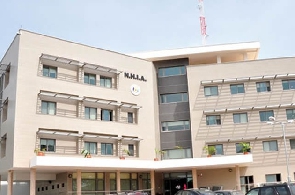National Health Insurance Authority (NHIA) Service providers have been urged to strictly work in line with the directives of the Authority and the Ghana Health Service to avoid sanctions.
Mr Fred Appiah, the Central Regional Director of the NHIA, made the call in a statement delivered on his behalf by Mr Isaac Fenell, Senior Monitoring and Evaluation Manager of the NHIA, at a stakeholders engagement at the Awutu-Effutu-Senya District office of the Authority at Winneba.
The meeting was on the theme: “Building a Sustainable Healthcare System: Exploring Benefits and Overcoming the Challenges of Co-payment in Achieving Universal Health Coverage (UHC).“
Mr Appiah reminded the service providers that it was a crime to continue to indulge in co-payment and other illegal charges and called for an immediate stop to that practice.
According to him, membership drive was key to achieving UHC by 2030 and therefore, the need to restore and continue to regain member confidence to help attain and sustain UHC for improved health status of the people.
He asked all the stakeholders to work together to help build a sustainable healthcare system for the benefit of all the people.
Mr Christopher Oddoye, District Manager of the Awutu-Effutu-Senya National Health Insurance Scheme (NHIS), stated that operations of the District Office covered Effutu Municipal and Awutu Senya Districts and that the office operated 42 active health facilities to ensure that the UHC was achieved.
He announced that the vulnerable group (LEAP indigents, School Feeding programme, and pregnant women) registration for 2023 stood at 19,631.
He reiterated calls to end co-payment practices because it was heavily affecting the vulnerable groups.
He disclosed that the total active membership of the Scheme was 113,651, representing 66 percent of the targeted figure of 171,000 for 2023.
Mr. Oddoye said in 2019, 32,622 new people were registered, compared to 20,803 in 2020, 27,636 in 2021, 17,807 in 2022 and 16,998 in 2023.
Also, a total of 102,562 people renewed their membership in 2019, 110,305 in 2020, 108,811 in 2021, 95,206 in 2022 and 76,191 in 2023.
“It is very obvious that the effect we have seen on the membership growth as a result of co-payment on the NHIS covered services, also affected timely cash inflows, directly impacting membership growth as well as the financial performance of the district,” he noted.
Mr Oddoye indicated that in the midst of co-payment and illegal charges, members still had confidence in the NHIA/NHIS as the only way to a sustainable, progressive, and equitable social healthcare system.
He enumerated some of their challenges to include co-payment practices, cash and carry, delay in reimbursement, lack of proper record-keeping system at some providers’ sites, and delay in credential renewals.
To achieve UHC, he said co-payment practices must be stopped, sensitisation on the use of NHIS renewal short code*929# and the MYNHIS APP be intensified, proper record-keeping systems in the facilities ensured, and also individuals, groups, and Institutions continue to sponsor the registration of vulnerable at the community level.
Mr Evans Nana Amoakwa, who represented the Central Regional Director of the Claims Processing Center (CPC), schooled participants on the benefit packages of the NHIA, which included, Outpatient and In-Patient Services, Oral Health, Maternity Care, and Emergencies.
He stated that services such as rehabilitation other than physiotherapy, cosmetic surgeries, aesthetic treatment, orthopaedics (diagnosis and treatment of defective eye movements and coordination), organ transplantation, and other medicines not on the NHIS medicine list were excluded from the benefits package.
As Ghana was journeying towards the attainment of UHC by 2030, he said it was important that all stakeholders collaborated to effectively and efficiently make it a reality.
Health News of Sunday, 7 January 2024
Source: GNA

















